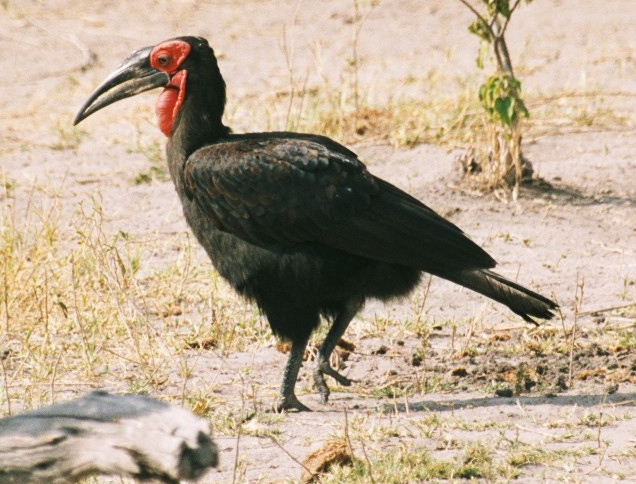|
| 질의: northern ground-hornbill | 결과: 4번째/5 | |
Southern Ground-hornbill (Bucorvus leadbeateri) - Wiki
| 제목: | Southern Ground-hornbill (Bucorvus leadbeateri) - Wiki
| |

| 해상도: 636x484
파일크기: 253441 Bytes
등록시간: 2007:11:26 12:15:20
|
Southern Ground-hornbill
From Wikipedia, the free encyclopedia
Order: Coraciiformes
Family: Bucerotidae
Subfamily: Bucorvinae
Synonyms: Bucorvus cafer
[Photo] Southern Ground-hornbill (Bucorvus leadbeateri) adult male. in Moremi National Park, Okavango Delta, Botswana. Image by Duncan Wright (http://en.wikipedia.org/wiki/User:Sabine%27s_Sunbird). Copyright (C) 2005 Duncan Wright
Permission is granted to copy, distribute and/or modify this document under the terms of the GNU Free Documentation License, Version 1.2 or any later version published by the Free Software Foundation; with no Invariant Sections, no Front-Cover Texts, and no Back-Cover Texts. A copy of the license is included in the section entitled "GNU Free Documentation License". |
The Southern Ground Hornbill, Bucorvus leadbeateri or Bucorvus cafer, is one of two species of ground-hornbill and is the largest species of hornbill.
It is a large bird, at 90 to 129 cm (36 to 51 in) long and a weight of 3.2 to 6.2 kg (7 to 13.6 lbs). It is characterized by black coloration and vivid red patches of bare skin on the face and throat (yellow in juvenile birds). The white tips of the wings (primary feathers) seen in flight are another diagnostic characteristic. The beak is black, straight and presents a casque, more developed in males. Female Southern Ground Hornbills are smaller and have violet-blue skin on their throats.
Its habitat comprises savannahs, woodlands and grasslands. It can be found from from northern Namibia and Angola to northern South Africa to Burundi and Kenya. The Southern Ground Hornbill is a vulnerable species, mainly confined to national reserves and national parks. They live in groups of 5 to 10 individuals including adults and juveniles. Often, neighbouring groups are engaged in aerial pursuits. They forage on the ground, where they feed on reptiles, frogs, snails, insects and mammals up to the size of hares. Juveniles are dependent on adults for 6 to 12 months.
The other species of the genus Bucorvus is the Abyssinian Ground-hornbill, Bucorvus abyssinicus.
http://en.wikipedia.org/wiki/Southern_Ground-hornbill
| The text in this page is based on the copyrighted Wikipedia article shown in above URL. It is used under the GNU Free Documentation License. You may redistribute it, verbatim or modified, providing that you comply with the terms of the GFDL. |
|
댓글 |
|---|
| | 손님 |
|
Scientific Name: Bucorvus leadbeateri (Vigors, 1825)
Common Names:
English – Southern Ground Hornbill
French – Bucorve du Sud, Grand Calao terrestre
Spanish – Cálao terrestre sureño
French: Bucorve du Sud German: Kaffernhornrabe Spanish: Cálao terrestre sureño
Taxonomy: Buceros Leadbeateri Vigors, 1825, Lower Bushman River, South Africa.
Synonyms:
Bucorvus cafer (Vigors, 1825) — BirdLife International (1994, 2000, 2004, 2008)
Bucorvus leadbeateri ssp. leadbeateri (Vigors, 1825) — Sibley and Monroe (1990, 1993) |
 |

|

|
northern ground-hornbill
4/5 |

|
 |
^o^
동물그림창고 똑똑전화 누리집
^o^
|
|
|